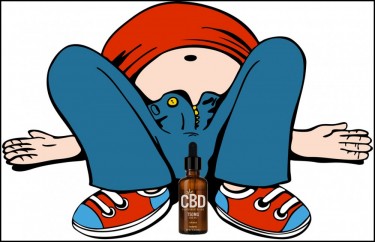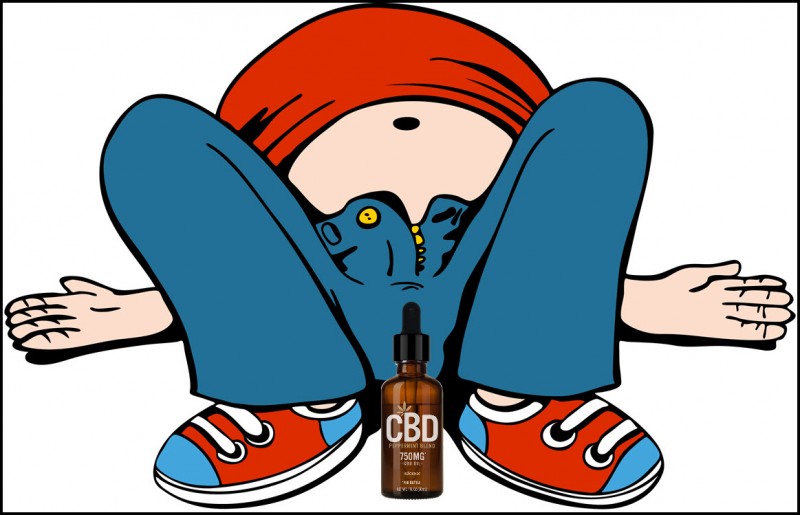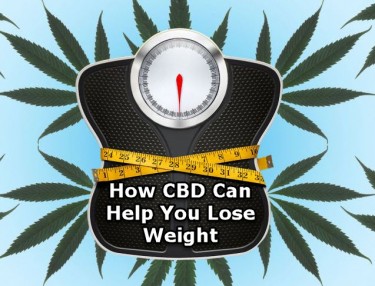Can CBD Help You Feel Full for a Longer Period of Time?

Getting the munchies is one of the hallmark signs associated with getting high.
So much so, that entire movies and memes have been made dedicated to the munchies. It can be described as the insatiable desire to eat, usually junk food, when you’re stoned. Some time ago, scientists did some research and attributed the munchies to THC (tetrahydrocannabinol), the psychoactive compound in cannabis that’s responsible for getting you high.
Now, there are several well-documented studies that explain why THC makes you hungry. “It’s hitting on some primitive areas of the brain, things that control appetite and emotions,” explains Ginger Hultin back in 2018; Hultin is a spokeswoman for the Academy of Nutrition and Dietetics, and a registered dietician. “THC Interacts with receptors in our brain that regulate emotions, pain and our sense of smell and taste,” explains Janice Newell Bissex, another registered dietician. “It can also promote the release of the hormone ghrelin, which stimulates hunger.”
For these reasons, the appetite-stimulating effect of cannabis hasn’t just been a fun or funny side effect, but it’s actually saved lives particularly for people who have eating disorders.
How About CBD?
However, CBD (cannabidiol), the other famous cannabinoid that doesn’t get you high but is known for its therapeutic benefits, can actually have the opposite effect. Emerging studies are showing that CBD could be beneficial for people who are trying to lose weight.
Studies have found that in obese people, the CB1 receptors are more prominent particularly in areas with lots of fatty tissue. This causes researchers to believe that there’s an association between obesity and the activation of CB1 receptors. After all, CBD and the other cannabinoids in the plant do work together in activating numerous receptors including serotonin, so it could certainly play a role in metabolic functions including weight loss.
In a 2018 study, it notes that CB1 receptor agonists reduce one’s appetite and controls obesity since the CB1 receptor agonists deactivate the receptor. On the other hand, THC stimulates the CB1 receptor to release the ghrelin hormone, causing us to increase our food intake. And since the THC levels in CBD products are virtually untraceable, it doesn’t affect your appetite and in fact can actually suppress it. This is good news for anyone who needs to get to a healthy weight.
Additionally, a review of more than 50,000 people found that people who consumed cannabis at least thrice per week had an obesity prevalence of 14-17%, while those who didn’t consume cannabis within the last 12 months had an obesity rate of 22-25%. We know that cannabis does contain some CBD, so it’s surely playing a role but scientists still aren’t 100% sure as to how. This is why researchers believe that taking whole plant cannabis has a great impact on metabolism, appetite, as well as other important bodily functions.
Furthermore, a study in the Netherlands wherein study participants were administered with various strains of cannabis revealed that those who consumed the strains with the highest amount of CBD had the least increase in appetite, compared to other subjects who consumed THC-only cannabis strains.
Other Ways CBD Can Help With Weight Loss
There have been other studies documenting how CBD can help people lose weight. Researchers also know that CBD helps convert the bad fat in the body to healthy fat. How does it do that exactly?
Well, there are two types of fat that we have: brown and white. Brown fat is responsible for providing heat to the body and burning calories, while white fat, also known as adipose, stores the fat to be used as energy while enabling it to cushion the organs and provide insulation. While we do need some adipose in the body, having too much of it has been linked to obesity and chronic illness.
It’s also known that people who are healthy possess more brown fat than white. But it’s also possible to convert the white fat into the brown fat whenever we get a lot of sleep, are exposed to the cold, and exercise a lot. Conversely, the brown fat can convert to white fat with an unhealthy lifestyle. Scientists have found that consumption of CBD assists the body with efficient conversion of white fat to brown fat, in a process we call “browning.” However, the only available studies of these so far are animal-based, but if we apply the same principles to humans, then CBD can certainly help burn more fat while aiding in metabolism.
CBD also helps reduce your risk for metabolic disorders. An overstimulation of CB receptors leads to a rise in metabolic syndrome risk, and CBD consumption helps block the CB1 receptors in fat which lowers the risk of obesity as well as other related illnesses including high cholesterol and high blood pressure.
Conclusion
If you want to start adding CBD to your routine to assist with weight loss and appetite control, there are some things you should keep in mind. For one, always be sure to go with high-quality CBD products. Second, and more importantly, remember that CBD products are not a one-off treatment that will cure obesity or diabetes.
Consider CBD as a complementary therapy to a healthy lifestyle including eating well and exercising regularly to maximize your weight-loss efforts. Thankfully these days there are so many ways you can easily incorporate CBD into your lifestyle to aid with weight loss: from inhalants, capsules, sprays, tinctures, edibles, creams, and so much more. Applying CBD topically can also help with recovery from workouts.
WEIGHT LOSS AND CANNABIS, READ MORE..
CAN WEED HELP YOU LOSE WEIGHT BY DOSAGE OR EFFECT?








